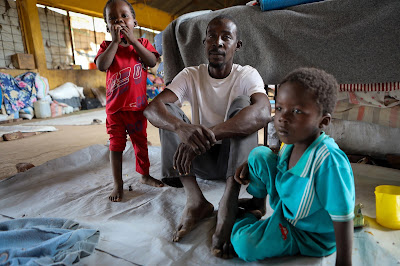Dated Wednesday, 17 January 2024 - excerpts:
Since the fighting began in April of last year, about half a million people have fled into neighbouring South Sudan, one of the poorest countries in the world, and thousands more are expected to follow the exodus. The UN has shared reports of horrific abuse and widespread rights violations. Loaded trucks have been unable to bring aid supplies because of fierce fighting. Drivers have been beaten and extorted for money, and aid workers have been detained and killed.
Peter Kioy, the Sudan Chief of Mission for IOM, spoke to Conor Lennon from UN News from his temporary base in the eastern city of Port Sudan about the dangerous situation facing the Sudanese people and the humanitarian workers trying to support them.
© WFP/Eulalia Berlanga South Sudanese returnees arrive at the Joda border point in Upper Nile State.
Peter Kioy: The humanitarian community has no capacity to oversee or access the areas where people are fleeing to or fleeing from, which makes it really difficult for us to ensure the international protection rights that they are entitled to. The lack of humanitarian aid makes them more vulnerable. Access remains one of the key issues for the humanitarian community in Sudan; we need more secure access for humanitarian actors. Both sides agreed to allow humanitarian access during peace talks, but they are still not delivering on that.
UN News: Do you still have people on the ground?
Peter Kioy: In some areas, we don't have people because it’s too dangerous, and the humanitarian space is shrinking. Recently, the conflict reached Al Jazirah state and White Nile state, which meant that humanitarian actors had to move out. Truck drivers do not feel secure going into some of those localities to deliver aid.
IOM Thousands of people have arrived at Metema, the border town between Sudan and Ethiopia, since fighting in Sudan erupted on 15 April 2023.
UN News: How have IOM staff been affected?
Peter Kioy: A staff member was killed at the onset of the crisis, and we had to regroup around our eastern offices in Kassala, Al Qadarif and Port Sudan.
However, we don’t know for how long. The RSF have said that they’re making their way east towards Port Sudan as well. We don’t know how quickly they will advance, so we remain in a precarious situation, where we don’t know what will happen in the next two months or even the next two weeks.
For now, the situation in Port Sudan remains relatively stable and calm, but it is a probably a false calm because we’re not sure of what is happening in and around the city.
So, we remain vigilant in case we find ourselves in a similar situation to Khartoum.
UN News: Can you describe the evacuation from Khartoum in April 2023
Peter Kioy: I think it’s a situation you would not want to find yourself in again.
It was chaotic. Bullets flying all around, people unable to move and seeking shelter under the furniture in their houses, hiding in corners and hoping that no stray bullets come through the windows.
No one expected that Khartoum would bear the brunt of the fighting, and so the necessary security measures were not in place. This made it very scary, especially for those who had family.
It was a nightmare that no one would want to live through or wish on others.
I remember that we were trying to coordinate our staff to get them to the gathering sites for the evacuation. It was difficult even in the relatively calm areas because of the number of rebel and government checkpoints. We didn’t know how the soldiers would react.
UN News: What is morale like amongst the UN teams in Port Sudan?
We have stayed behind to deliver aid, and we have the capacity, but we do not have access to the people who are in need of our support, and that has become frustrating.
There are pockets of hope. We managed, for example, to bring in cross-border support from Chad into Darfur and deliver some vital humanitarian aid. But, it still remains a challenge, and we hope that with the ongoing negotiations greater access can be granted to the humanitarian community at large.
View original: https://news.un.org/en/interview/2024/01/1145602
ENDS

.jpeg)

.jpeg)



